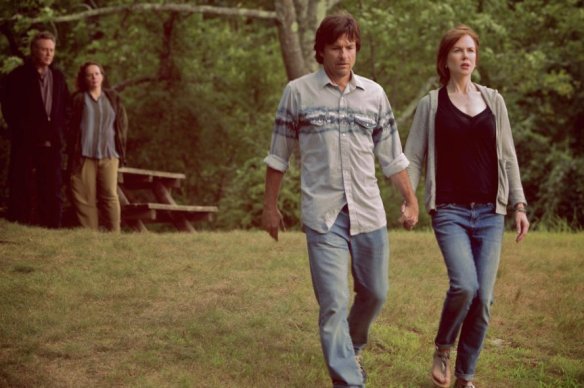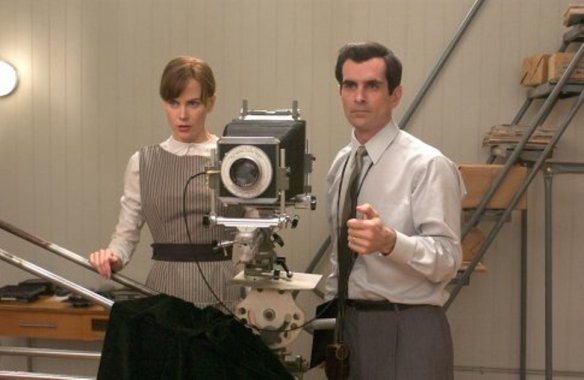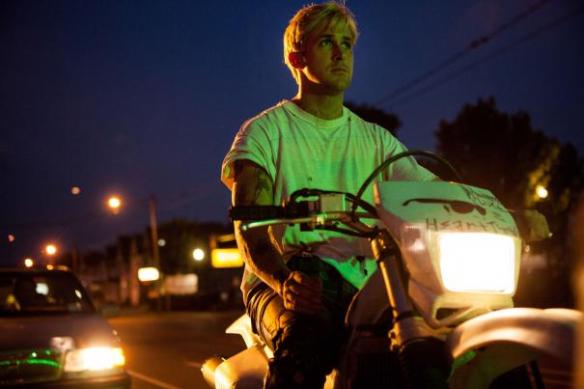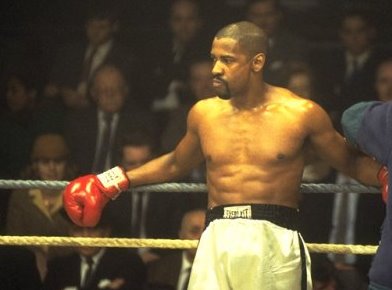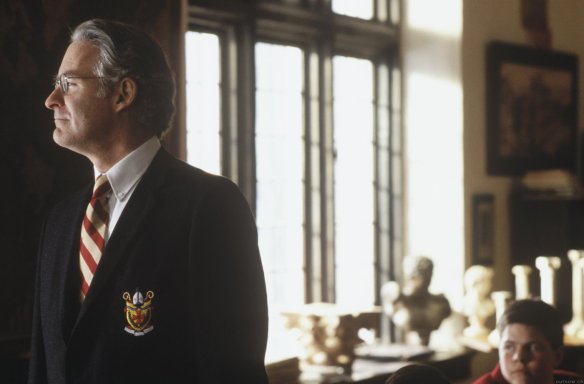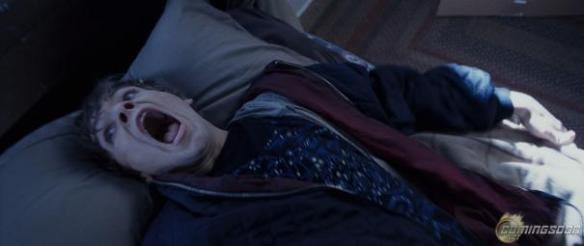(2015) Dramedy (Starz Media) Nicole Kidman, Jason Bateman, Christopher Walken, Maryanne Plunkett, Kathryn Hahn, Jason Butler Harner, Josh Pais, Marin Ireland, Harris Yulin, Michael Chernus, Eugenia Kuzmina, Linda Emond, Mackenzie Brooke Smith, Jaiden Kaine, Grainger Hines, Scott Shepherd, Steve Witting, Danny Burstein, Taylor Rose, Genevieve Adams. Directed by Jason Bateman
Family isn’t always the way you envision it to be. Different families have different dynamics and what works for one might not necessarily work for another. And not all families are necessarily benevolent to their children either.
Caleb Fang (Harner) is an Artist (note the capital). He believes in Art above all else. His art is subversive performance art, usually utilizing his wife (Hahn) and children, whom he refers to as A and B. He has the kids pose as bank robbers, street buskers and other bizarre things without the general public knowing what’s going on. Caleb films everything to see the reaction of passersby. In an era before YouTube, he becomes a sensation in the art world but his kids grow up hating that their childhood was essentially hijacked in the name of art.
As adults, Baxter Fang (Bateman) has become a novelist who has written one good book and then one that he characterizes as “divisive,” and in the throes currently of a ginormous writer’s block. Annie Fang (Kidman) is an actress who, like most actresses of a certain age, is getting fewer and fewer good parts. When Baxter covers a redneck sporting event (in an effort to make some cash while his muse has dried up) and sustains a freakish head injury, his parent offer to help him convalesce. Baxter, terrified of being alone with Caleb (Walken) and Camille (Plunkett), convinces his reluctant sister to come along and save him.
Of course, Caleb wants to involve his children in a new art piece but when they refuse he gets extremely angry. Annie is hoping to snag a part that would jumpstart her career again and Baxter…well he’s still recovering and still can’t write a word. However when their parents turn up missing and later their car is found with Caleb’s blood on the front seat, both of the siblings are extremely concerned. Has something awful truly happened, or could this be their greatest prank ever?
Bateman, who debuted as a director with the solid Bad Words does well with this adaptation of the bestselling novel by Kevin Wilson. This is a bit different than his previous effort as there is as much drama here as comedy. Bateman has always been a fine comic actor but shows some dramatic chops here and shows he can actually do some fine dramatic work. Considering he’s working off of Walken and Kidman, both of whom are extremely talented actors in their own right, he not only holds up with them but stands out. This is by far the most complex character he’s had to play in a movie yet.
Kidman and Walken also deliver solid performances, Walken in particular stealing the screen with his patented laser beam stare. Veteran stage actress Plunkett also kicks in with a fine screen performance. In the flashback sequences, Hahn is solid as is Harner, and Burstein and Emond also deliver noteworthy support. Bateman is clearly establishing himself as an actor’s director, and this kind of darkly comic material is right in his wheelhouse.
The only problem is that the middle third is a bit slow but it does kick it up a notch during the final third of the film. Other than that, this is a fine dark comedy with dramatic overtones that examine the dynamics of the dysfunctional family, how parents sometimes don’t do what’s best for their kids so much as what’s best for themselves and finally, the difference between art and Art and why one is superior and the other pretentious.
REASONS TO GO: Jason Bateman gives one of his best performances ever. The humor is subversive.
REASONS TO STAY: Drags a bit in the middle.
FAMILY VALUES: There’s a fair amount of cussing.
TRIVIAL PURSUIT: Nicole Kidman’s father visited her on the upstate New York set, but that was the last time they would see each other as he passed away on September 14, 2014. The world premiere would be exactly one year to the day of his death.
CRITICAL MASS: As of 6/11/16: Rotten Tomatoes: 78% positive reviews. Metacritic: 67/100.
COMPARISON SHOPPING: I Heart Huckabees
FINAL RATING: 7.5/10
NEXT: Louder Than Bombs

